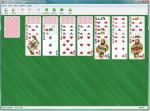 Even though I work alone, I’ve learned how to be my own best boss.
Even though I work alone, I’ve learned how to be my own best boss.
I have some managerial experience. For sixteen years I managed a medical office, and I took good care of my co-workers. It’s taking me about as long to learn how to take good care of myself.
Hands down, praise works best, so I try to appreciate any small step I take toward the larger task at hand – which is drafting a 100,000-word novel. One of the unintended consequences of this practice is that as I’m not just kinder and gentler toward myself, I’m kinder and gentler toward others. If I live long enough, I may actually become a genuinely nice person.
But I must admit that I still have days when I don’t want to sit down by myself to write a book that might never see the light of day. Some days, I’ll do anything to avoid writing, including putting off starting, going off on a tangent, or becoming paralyzed by doubt.
While I could try to turn these problems into an affirmation, “Hey Deb, you’re human!” I’ve found a more effective countermeasure to resistance.
Resistance is what keeps us from accomplishing our goals – from the little ones, like sitting down to write, to the big ones, like finishing a book.
According to nutritionist and writer Linda Spangle, it’s possible to defeat resistance by understanding its components and knowing what to do about them.. Resistance is manifested by Fear, Uncertainty and Doubt.
Typically, we respond to Fear with Procrastination. (Solitaire, anyone?) The best countermeasure to Procrastination is to Start: open a new  document and start typing.
document and start typing.
We respond to Uncertainty with Distraction. Ever start writing a piece and decide you really need to read War and Peace before you can do a good job? But before you can turn the page, you need to clean the litter box, which reminds you to put laundry detergent on the grocery list and make a dentist appointment for a cleaning six months hence? You get the idea. The best way to counter Distraction is with Focus.
And then there’s Doubt. Three quarters of the way through a draft and you become paralyzed by a needling voice that whispers, “You really think this is any good? Who are you kidding?” Doubt is responsible for countless unfinished stories in untold files around the world. But even Doubt can be defeated. Just Finish.
I have a Post-It above my desk. It says: Start. Focus. Finish.
Essentially, this is another way of saying, “Single Task” – which I wrote about in Part One of this post. And sometimes, I have to go through NAMS before I can Start, Focus, Finish. The more I practice these techniques, the better I get at sitting down, writing, revising, rewriting and returning to my desk day after day in what can be the most satisfying job working for the best boss I’ve ever had: me.

Deborah Lee Luskin is the author of Into the Wilderness, an award-winning novel set in Vermont in 1964.

” If I live long enough, I may actually become a genuinely nice person.”? You ARE a genuinely nice person!
Very helpful piece
Thanks, Danny. And Congratulations on receiving the 2013 Nautilus Book Award for WHAT A PLANT KNOWS!
Thank you for the inspiration.
You’re welcome. Thanks for reading the blog!
I went back to read Part 1 before reading this one…great tips that you have kindly shared. I’m having a ‘why bother’ period at the moment but your Start Focus Finish has helped a great deal – I will be making a plaque and putting it on my writing desk.
Oh, those “why bother” days! Be kind to yourself – they do pass, and I suspect that lots of subterranean growth is going on in the meanwhile.
Best, Deborah.
Good plan – distracting thoughts are time thieves.
Sounds like a you had an “apprenticeship” which helped you once you became your own office.
Time thieves indeed!
Thanks for your comments, Deborah.
Thank you for both of these posts. The hardest part for me is staying on task – I often get distracted by not deciding which project I’m going to work on right now, and then starting several…or sometimes veering off in a completely different direction to avoid it all together, like you suggest. I’m stealing your Post-it idea. Thanks!
I’m glad you found these posts helpful. Good luck!
Keyword – practice!
Always practicing, and still learning.
“Always practicing, and still learning.” – a good motto for life!
Thanks, Deborah.
Ive just read a wonderful book called The (Honest) Truth About Dishonesty, by behavioural economist Dan Ariely. Among other things, he discusses how we lie to ourselves and what increases lying and truthfulness.
One really important finding is around “depletion” of willpower. He found that tiredness and stress affect our willpower, and more surprisingly, every instance of resisting temptation depletes our reserves of willpower.
Why is this surprising? You might expect that practice would make resisting temptation (such as a game of solitaire) easier. The reverse is true. Every time you are tempted to play solitaire and resist, you deplete your reserves of willpower. And I mean your general reserves. That is, if you resist solitaire, you are more likely to give into the temptation of that cake in the fridge and vice versa.
The lessons?
1) Temptation-proof your home or office. Uninstall solitaire, throw out junk food, ditch tempting tv shows recorded on your hard drive, put War and Peace somewhere out of sight and out of mind.
2) give into temptation in one area if you need your willpower in another – eat the cake that has been preying on your mind when you are working on a hard part of your book that tends to drive you to solitaire. Don’t start a diet when you have a deadline! Remember that giving into temptation is sometimes quite helpful
3) try to do your hardest work when you feel the least depleted – in the morning perhaps or after a lunch break
4) anything you do that is mentally taxing is detrimental to your willpower, so it is hard to go straight from, say, doing a really hard cryptic crossword (unless this relaxes you) to working on a hard passage of writing
Ariely’s book at great and full of many lessons applicable to writing and life in general.
Thank you for this wonderful book review and these new insights into taming distraction. I do wonder, though, if there is a positive aspect to distraction? Does it allow another part of our brain to freewheel?
Thanks again, Deborah.
Well spoken! Thank you! “We respond to Uncertainty with Distraction. Ever start writing a piece and decide you really need to read War and Peace before you can do a good job? But before you can turn the page, you need to clean the litter box, which reminds you to put laundry detergent on the grocery list and make a dentist appointment for a cleaning six months hence? You get the idea. The best way to counter Distraction is with Focus”. That is English to me, I do it all the time. Differences in the to do list- feed the bird, got go get the mail, oh wait need to start the Slow Cooker…! 🙂
Ah, yes – but once you start the slow cooker, there’s plenty of time to write, right?!
Thanks for reading and commenting on the blog, Deborah.
Start. Focus. Finish. Love that!
Great! Glad it’s helpful. Good luck!
Reblogged this on Shimonjames's Blog and commented:
deborah, deb debba hubba hubba da goooricch gotta goooood wrench